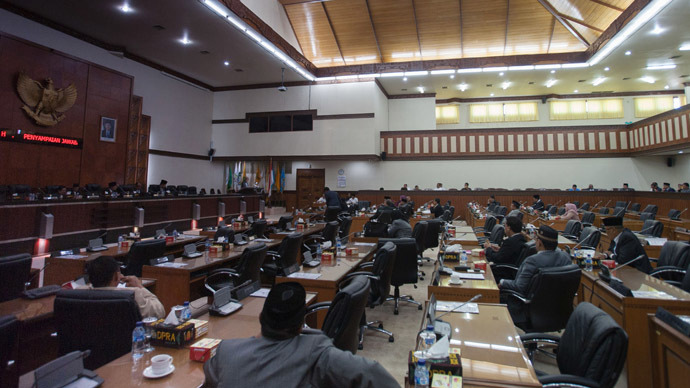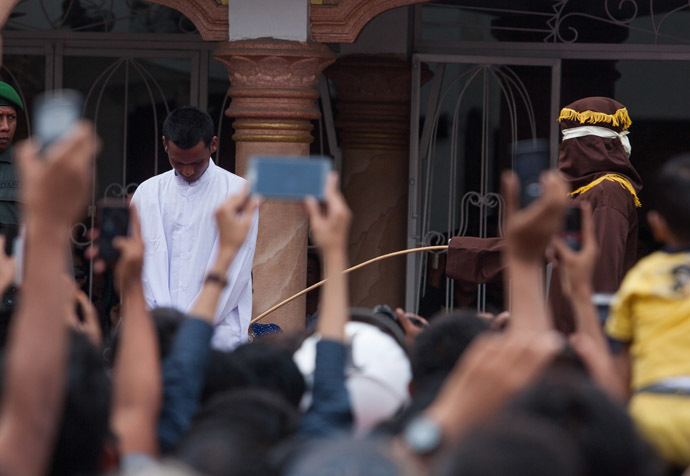100 lashes (or 100 months in jail) for gay sex in Indonesian province

Lawmakers in an Indonesia province have passed a harsh anti-gay sex law which will subject violators to public caning and force the regions non-Muslim population to adhere to their interpretation of Islamic Sharia law.
The 69-member Aceh provincial assembly passed the measure unanimously, following hours of debate on Saturday. The measure was voted on before a new 81-member regional parliament takes over in Aceh province next week, lawmaker Mahyaruddin Yusuf from the Islamist Prosperous Justice Party told AP.
According to the law, anal sex between men is punishable by up to 100 lashes, 100 months in jail or a fine of 1,000 grams of gold. Women who are found guilty of “rubbing” their bodies against each other for “stimulation” can also be subjected to public flogging.
The law doesn't mention other sex acts, prompting speculation that the legislation was either poorly thought out or that local clerics considered them acceptable.
Aceh is the only Indonesian province that practices Sharia law and has enforced Islamic punishment for a number of offenses. People convicted of adultery, gambling and consuming alcohol already face caning. Women can also be flogged for skipping Friday prayers or wearing tight clothing.
Amnesty International says at least 156 people have been caned in Aceh since 2010 for violating Sharia law.

The province’s non-Muslim minorities, who make up roughly 1 percent of the population, are also subject to Sharia law. Officials said canings are mainly intended to humiliate rather than inflict physical pain. Although the central government is limited in its power to overturn the legislation, human rights groups say the law runs afoul of international treaties signed by Indonesia protecting the rights of minorities and women. Gay rights activist King Oey has urged Jakarta to pressure the local body to overturn the law, or appeal it at the constitutional court.
"It's discriminatory and saddening," he told AP. "We urge people who are concerned with human rights to not sit by silently."
Richard Bennett, Amnesty International's Asia-Pacific director, said the law would serve to increase “the climate of homophobia, fear and harassment many in Aceh are already facing.”
But Muhammad Harun, spokesman for the leading Aceh Party, said the measure was welcomed by the local population.
“This bylaw has been highly anticipated by the people of Aceh, who have long wanted to see complete Islamic law on the veranda of Mecca,” AFP cited him as saying after the session.
The law must be approved by the Indonesian Interior Ministry in Jakarta, which signaled last week it could step in to overturn the legislation.
But Ramli Sulaiman, a local lawmaker who heads the commission that drafted the bill, told AFP that all relevant agencies in Jakarta had given it the green light.
Although Indonesia's criminal code does not proscribe homosexuality, Aceh was granted the right to establish a version of Islamic Sharia law in 2001 to bring an end to nearly three decades of bloody insurrection in the province. In 2005, a peace agreement was signed that granted Aceh greater autonomy on condition that it remained within Indonesia, which comprises a sprawling archipelago of islands.
Authorities in Jakarta have subsequently developed more power to regional authorities in order to boost autonomy in the world’s most populous Muslim nation and speed up development.














